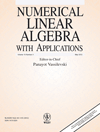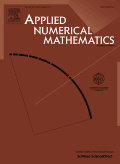
BIT NUMERICAL MATHEMATICS
Scope & Guideline
Advancing the Frontiers of Numerical Analysis.
Introduction
Aims and Scopes
- Numerical Analysis and Algorithm Development:
The journal publishes research on new numerical methods, including convergence analysis, stability, and error estimation, aimed at solving ordinary and partial differential equations, integral equations, and other mathematical models. - Applied Mathematics and Computational Techniques:
Focus on applied numerical methods that cater to real-world problems, particularly in physics, engineering, and finance, utilizing computational techniques to derive practical solutions. - Interdisciplinary Approaches:
Encouragement of interdisciplinary research that combines numerical methods with other fields such as optimization, statistics, and machine learning, reflecting the evolving nature of applied mathematics. - Advanced Computational Techniques:
Research on innovative computational frameworks and tools, including high-performance computing, adaptive methods, and parallel algorithms, designed to tackle large-scale problems efficiently. - Theoretical Foundations and Mathematical Rigor:
Emphasis on the theoretical underpinnings of numerical methods, ensuring that the proposed algorithms are not only efficient but also grounded in solid mathematical principles.
Trending and Emerging
- Stochastic Differential Equations (SDEs):
An increasing number of papers focus on numerical methods for stochastic differential equations, reflecting the growing importance of uncertainty quantification and stochastic modeling in various applications. - Adaptive and High-Order Methods:
Emerging interest in adaptive algorithms and high-order numerical methods indicates a trend towards achieving greater accuracy and efficiency, particularly for complex and multi-dimensional problems. - Machine Learning and Data-Driven Approaches:
The integration of machine learning techniques with traditional numerical methods is on the rise, highlighting a shift towards data-driven approaches that leverage computational power to solve complex mathematical problems. - Multiscale and Multi-physics Problems:
Research addressing multiscale and multi-physics problems is becoming increasingly prevalent, as these topics are crucial for modeling complex systems in engineering, physics, and biology. - Robustness and Stability in Numerical Methods:
There is a growing emphasis on developing robust numerical methods that maintain stability under various conditions, catering to the demands of real-world applications where uncertainties and variabilities are common.
Declining or Waning
- Classical Numerical Methods:
Traditional numerical methods, such as basic finite difference and finite element techniques, are appearing less frequently as the field shifts towards more sophisticated and adaptive approaches that address complex problems. - Single-Domain Approaches:
Research focusing solely on single-domain numerical methods is declining in favor of multi-domain and domain decomposition techniques, which offer better performance for complex geometries and multi-scale problems. - Numerical Methods with Limited Applications:
There is a noticeable reduction in publications focused on numerical methods that cater to niche applications, as researchers increasingly seek broader applicability and interdisciplinary relevance in their work.
Similar Journals

NUMERICAL METHODS FOR PARTIAL DIFFERENTIAL EQUATIONS
Transforming mathematical analysis through peer-reviewed excellence.Numerical Methods for Partial Differential Equations is a prestigious academic journal published by Wiley, dedicated to advancing the field of numerical analysis and computational mathematics. With a prominent standing reflected in its Q1 rankings across multiple categories including Analysis, Applied Mathematics, Computational Mathematics, and Numerical Analysis, this journal serves as a vital resource for researchers, professionals, and students alike. Since its inception in 1985, NUMERICAL METHODS FOR PARTIAL DIFFERENTIAL EQUATIONS has consistently published high-quality, peer-reviewed articles that explore innovative numerical techniques and their applications across disciplines. The journal is indexed in leading databases, ensuring broad visibility and access for its contributors. Aimed at fostering cutting-edge research, it invites submissions that provide new insights and methodologies for solving complex partial differential equations, making it an essential source for anyone interested in the intricacies of mathematical analysis and computational techniques.

Numerical Analysis and Applications
Pioneering new pathways in the world of numerical applications.Numerical Analysis and Applications is a prominent journal dedicated to advancing the field of numerical analysis, published by the Siberian Branch of the Russian Academy of Sciences. Established in 2009, and running through to 2024, this scholarly publication serves as a vital resource for researchers, professionals, and students involved in the mathematical sciences. The journal’s impact is underscored by its classification in the Q3 quartile for numerical analysis within the latest metrics, reflecting its significance in the academic community, although it presently ranks 74 out of 88 in the numerical analysis category, representing a 16th percentile. With a broad scope that encompasses innovative methodologies and applications in numerical techniques, the journal aims to foster interdisciplinary collaboration and share pivotal advancements in numerical theory and practice. Access options may vary, thus offering opportunities for both traditional and contemporary researchers to engage with cutting-edge content that is crucial for driving forward the computational sciences.

JOURNAL OF COMPUTATIONAL MATHEMATICS
Connecting Practitioners and Theorists in Mathematical InnovationJOURNAL OF COMPUTATIONAL MATHEMATICS, published by GLOBAL SCIENCE PRESS, is a distinguished peer-reviewed academic journal dedicated to advancing the field of computational mathematics. With a focus on high-quality research that bridges theoretical and practical applications, this journal aims to disseminate innovative methodologies and robust algorithms that address complex mathematical problems. Operating without an open-access model, it maintains a reputable standing with a Q2 category classification in computational mathematics as of 2023, showcasing its influence and relevance within the academic community. The journal, which has been in publication since 1996, continues to evolve, providing a platform for researchers, practitioners, and students to engage with cutting-edge developments up to 2024. By contributing to the body of knowledge in computational mathematics, this journal plays a vital role in fostering collaboration and advancement in related disciplines.

NUMERICAL LINEAR ALGEBRA WITH APPLICATIONS
Innovating Solutions through Numerical Linear AlgebraNUMERICAL LINEAR ALGEBRA WITH APPLICATIONS, published by Wiley, is a premier journal dedicated to advancing the fields of numerical linear algebra, applied mathematics, and their interrelated applications. With ISSN 1070-5325 and E-ISSN 1099-1506, it has established itself as an essential resource for researchers, academics, and practitioners interested in cutting-edge developments in numerical methods and their practical implications. The journal has attained an impressive Q1 ranking in both Algebra and Number Theory and Applied Mathematics as of 2023, highlighting its influence and prestige within the mathematical community. Spanning from 1994 to 2024, NUMERICAL LINEAR ALGEBRA WITH APPLICATIONS is recognized for its rigorous peer-reviewed publications that address the theoretical and algorithmic advancements in numerical linear algebra, making it a critical reference for professionals and students alike. The journal is not Open Access, which encourages subscribers to gain access to high-quality research outputs that promote innovation and multidisciplinary collaborations in mathematics.

Communications on Applied Mathematics and Computation
Fostering Excellence in Applied Mathematics and ComputationCommunications on Applied Mathematics and Computation is a distinguished journal published by SpringerNature, dedicated to advancing the fields of Applied Mathematics and Computational Mathematics. With its ISSN 2096-6385 and E-ISSN 2661-8893, the journal has established itself as a critical platform for researchers seeking to disseminate their findings and engage with contemporary mathematical challenges. Recognized in the Q2 quartile of both Applied Mathematics and Computational Mathematics categories for 2023, it ranks impressively within its field, holding the 278th position in a pool of 635 journals for Applied Mathematics and the 89th out of 189 for Computational Mathematics, indicative of its scholarly impact. The journal facilitates open access to a plethora of pioneering research, promoting collaboration and innovation in a global academic community. With a commitment to high-quality publications from 2019 through 2024, Communications on Applied Mathematics and Computation serves as an essential resource for scholars and practitioners aiming to bridge theory and practical applications in mathematics.

Frontiers of Mathematics
Unlocking Potential Through Open Access MathematicsFrontiers of Mathematics, published by SPRINGER HEIDELBERG, is an emerging academic journal dedicated to fostering the advancement of mathematical sciences from 2023 to 2024. With an ISSN of 2731-8648 and E-ISSN of 2731-8656, this journal is positioned in the category of Q2 in the miscellaneous mathematics domain, showcasing its commitment to quality research and innovation. Although in its nascent stages, it has swiftly established a foothold within the global academic landscape, holding a Scopus rank of #198/399 and a median percentile of 50, indicating a promising trajectory. By providing an open-access option, Frontiers of Mathematics ensures broad dissemination of research findings, fostering collaboration and knowledge sharing across the mathematical community. Researchers, professionals, and students alike will find this journal to be an invaluable resource, contributing to important discussions and advancements in various mathematical fields.

COMPUTATIONAL MATHEMATICS AND MATHEMATICAL PHYSICS
Transforming Theoretical Concepts into Practical SolutionsCOMPUTATIONAL MATHEMATICS AND MATHEMATICAL PHYSICS is a prestigious journal published by PLEIADES PUBLISHING INC, dedicated to advancing the fields of computational mathematics and mathematical physics. With an ISSN of 0965-5425 and an E-ISSN of 1555-6662, the journal has established its importance within the academic community since its inception in 1985. It is classified in the third quartile (Q3) for computational mathematics in 2023, and while currently it does not offer open access options, it remains a valuable resource for researchers seeking to disseminate their findings and engage with cutting-edge developments in the field. The journal encompasses a broad spectrum of topics, including numerical analysis, applied mathematics, and the intersection of physics and computational techniques, highlighting its relevance in addressing complex problems in both theoretical and applied contexts. Scholars will find a platform that not only promotes rigorous research but also encourages collaboration and innovation within the scientific community.

ESAIM-Mathematical Modelling and Numerical Analysis
Advancing Mathematical Frontiers with PrecisionESAIM-Mathematical Modelling and Numerical Analysis, published by EDP SCIENCES S A, is a prestigious open-access journal at the forefront of the fields of mathematical analysis, applied mathematics, computational mathematics, modeling, simulation, and numerical analysis. With an impressive Q1 ranking in multiple categories for 2023, the journal is recognized for its contribution to advanced research, particularly in areas that intertwine mathematical theory with practical applications. The journal’s ISSN is 2822-7840 and its E-ISSN is 2804-7214, showcasing its commitment to both traditional and digital dissemination of knowledge. Spanning from 1996 to 2024, ESAIM has established itself as a vital platform for scholars seeking to publish innovative research and engage with the latest advancements in the field. Researchers and practitioners can explore the journal’s content through various access options, fostering a collaborative environment for the sharing and development of new mathematical methodologies. Situated in France, ESAIM continues to attract an international readership, driving forward the global discourse in mathematical sciences.

Applied Numerical Mathematics
Exploring New Horizons in Applied Mathematics.Applied Numerical Mathematics is a prestigious journal published by Elsevier, focused on advancing the field of numerical analysis through rigorous research and innovative methodologies. With an impressive impact factor and a solid reputation, this journal occupies a leading position in the academic community, as evidenced by its Q1 rankings in Applied Mathematics, Computational Mathematics, and Numerical Analysis for 2023. This status makes it an essential resource for researchers and professionals eager to stay at the forefront of numerical techniques and applications. Covering a broad range of topics from algorithms to theoretical developments, the journal invites submissions that contribute to the theoretical and practical advancements in numerical methods. Its convergence over the years, beginning in 1985 and extending through 2025, signifies its enduring relevance and commitment to addressing contemporary scientific challenges. Despite its traditional publication model, researchers can access the journal's rich content through various institutional subscriptions, facilitating the dissemination of knowledge across the globe.

ADVANCES IN COMPUTATIONAL MATHEMATICS
Unleashing Potential through Cutting-edge Mathematical ResearchADVANCES IN COMPUTATIONAL MATHEMATICS, published by Springer, is a leading international journal dedicated to the dynamic and rapidly evolving fields of Applied Mathematics and Computational Mathematics. With an impressive Q1 ranking in both categories as of 2023, the journal serves as a vital platform for researchers and professionals to disseminate innovative methodologies and computational techniques that address complex mathematical challenges. Operating since 1993 and continuing to contribute substantially to the academic landscape through 2024, it boasts a robust reputation within the mathematics community, underscored by its Scopus rankings—#230 out of 635 in Applied Mathematics and #80 out of 189 in Computational Mathematics. This journal, based in the Netherlands, emphasizes cutting-edge research while offering a wealth of access options to facilitate scholarly communication. As such, ADVANCES IN COMPUTATIONAL MATHEMATICS stands as an essential resource for anyone interested in the forefront of computational techniques and mathematical theory.